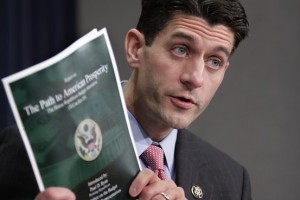GOP Wants $4T In Cuts Next Decade
 The Wall Street Journal reports:
The Wall Street Journal reports:
Republicans will present this week a 2012 budget proposal that would cut more than $4 trillion from federal spending projected over the next decade and transform the Medicare health program for the elderly, a move that will dramatically reshape the budget debate in Washington.
The budget has been prepared by Rep. Paul Ryan, a Wisconsin Republican and the new chairman of the House Budget Committee, and it represents the most complete attempt so far by Republicans to make good on their promises during the 2010 midterm elections to cut government spending and deficits.
Though Rep. Ryan based the Medicare portion of his budget on a previous plan created in collaboration with a Democrat, Alice Rivlin, a senior fellow at the Brookings Institution and long-time budget expert, the current plan isn't likely to get much Democratic support. Instead, it will set up a broad debate over spending and the role of government heading into the 2012 general election.
The plan would essentially end Medicare, which now pays most of the health-care bills for 48 million elderly and disabled Americans, as a program that directly pays those bills. Mr. Ryan and other conservatives say this is necessary because of the program's soaring costs. Medicare cost $396.5 billion in 2010 and is projected to rise to $502.8 billion in 2016. At that pace, spending on the program would have doubled between 2002 and 2016.
Mr. Ryan's proposal would apply to those currently under the age of 55, and for those Americans would convert Medicare into a "premium support" system. Participants from that group would choose from an array of private insurance plans when they reach 65 and become eligible, and the government would pay about the first $15,000 in premiums. Those who are poorer or less healthy would receive bigger payments than others.
"There is nobody saying that Medicare can stay in its current path," Mr. Ryan said on Fox News Sunday. "We should not be measuring ourselves against some mythical future of Medicare that isn't sustainable."
The proposal would also convert Medicaid, the health program for the poor, into a series of block grants to give states more flexibility. And it is expected to suggest significant cuts in Social Security, while proposing fewer details on how to achieve them.
The federal government expects to spend about $275 billion in 2011 on Medicaid, the program that provides medical care to the poor and disabled, up from $117.9 billion in 2000. The Congressional Budget Office projects Medicaid spending will roughly double by 2021.
Conservative activists who are familiar with the Ryan plan said they expect it to call for a fundamental overhaul of the tax system, with a 25% top rate for both individuals and corporations, compared to the current 35% top rate. It is expected to raise about the same amount of money as the current system, however. Lawmakers already are considering ways to accomplish that by reducing or eliminating some deductions and other tax breaks.
Some conservatives also expected the budget plan to tout a temporary tax change that would let U.S. multinationals bring home as much as $1 trillion in profits at a greatly reduced tax rate. That money currently is parked overseas, beyond the reach of U.S. corporate taxation.
Mr. Ryan and other Republicans on Sunday made it plain a primary goal in advancing the budget plan is to start setting the terms of a debate for the 2012 election, and to move beyond the debate over trimming tens of billions in spending during the remaining six months of the current fiscal year. The government could partially close on Friday if no deal is reached.
Click here to read more.

